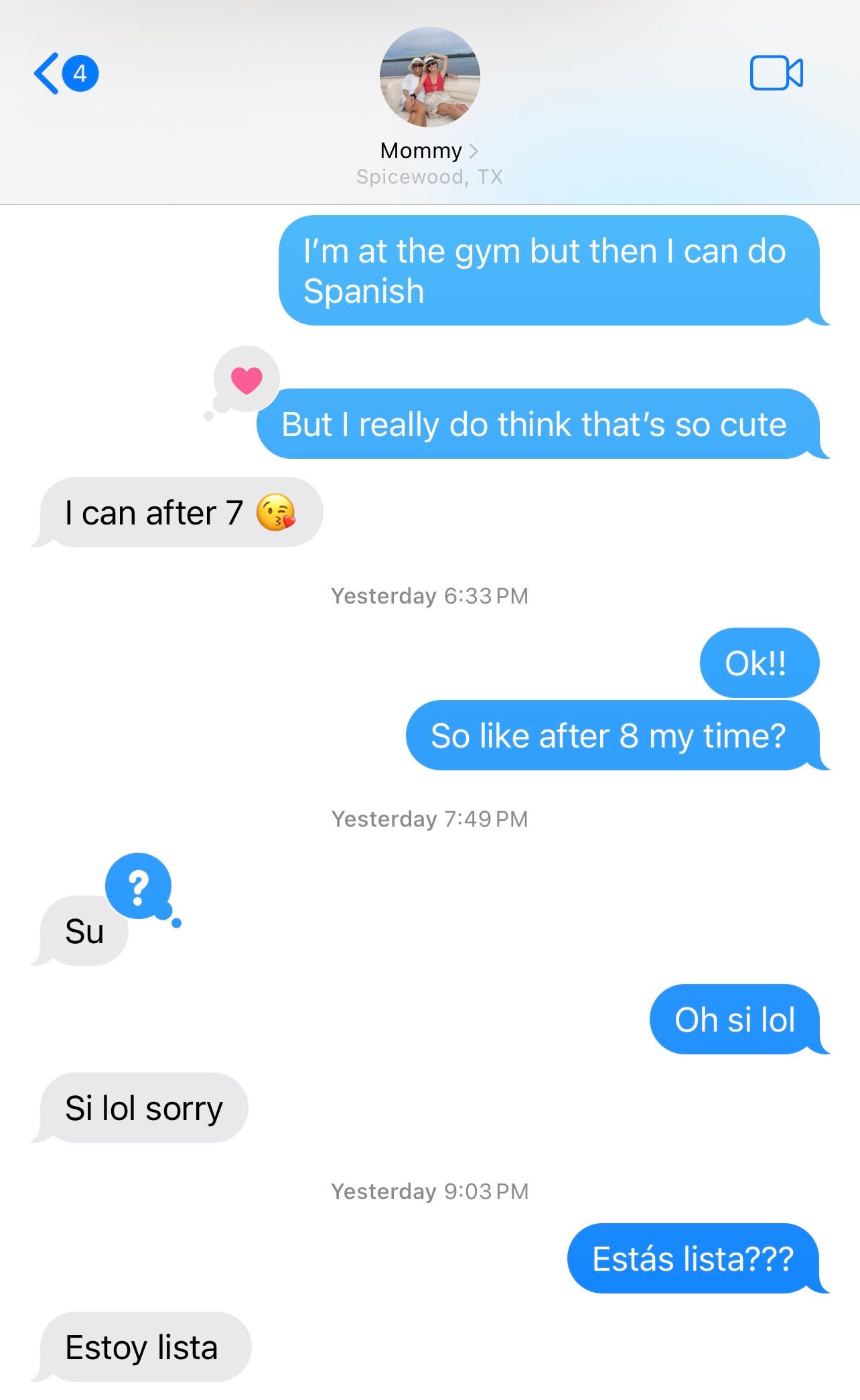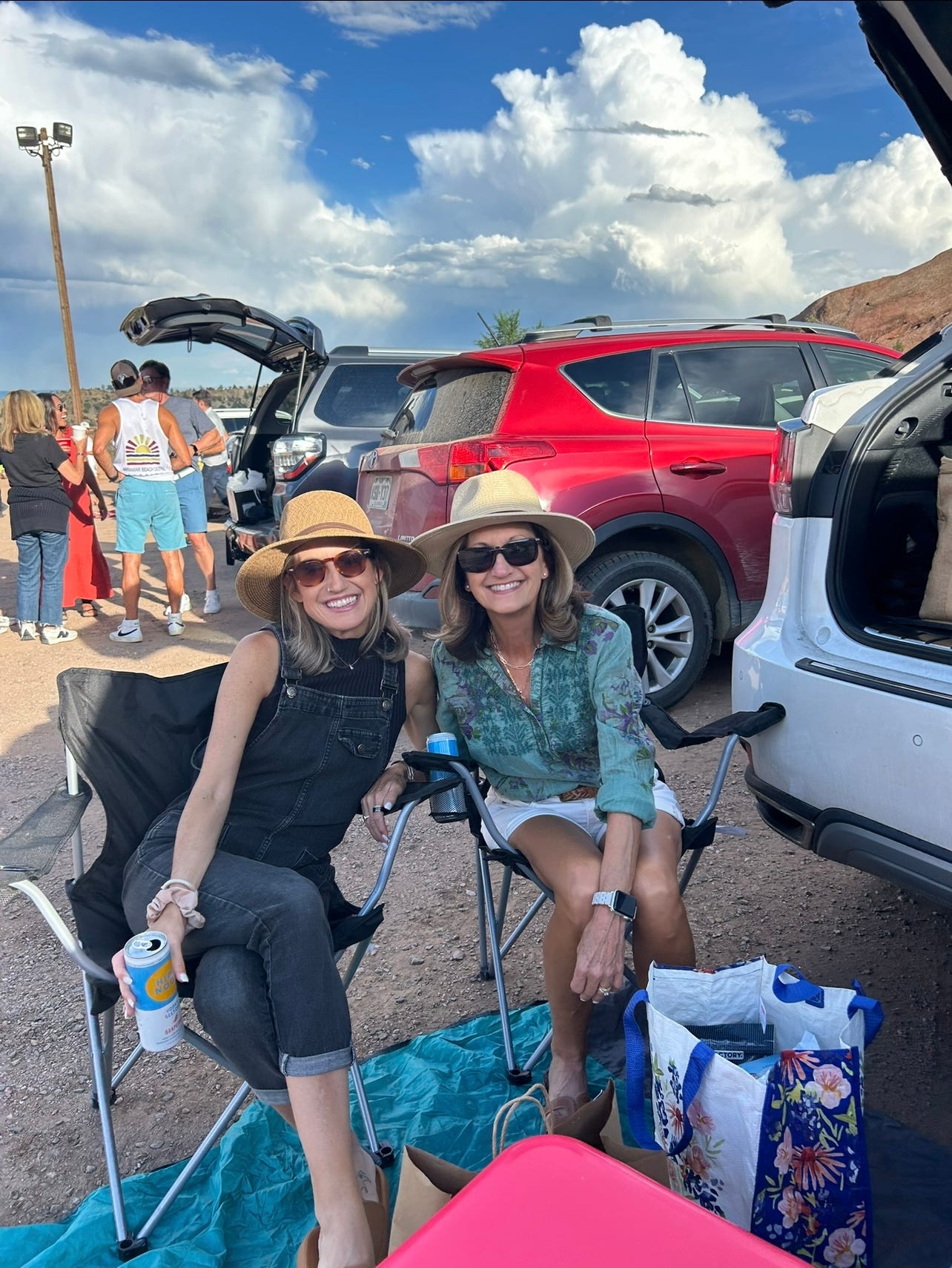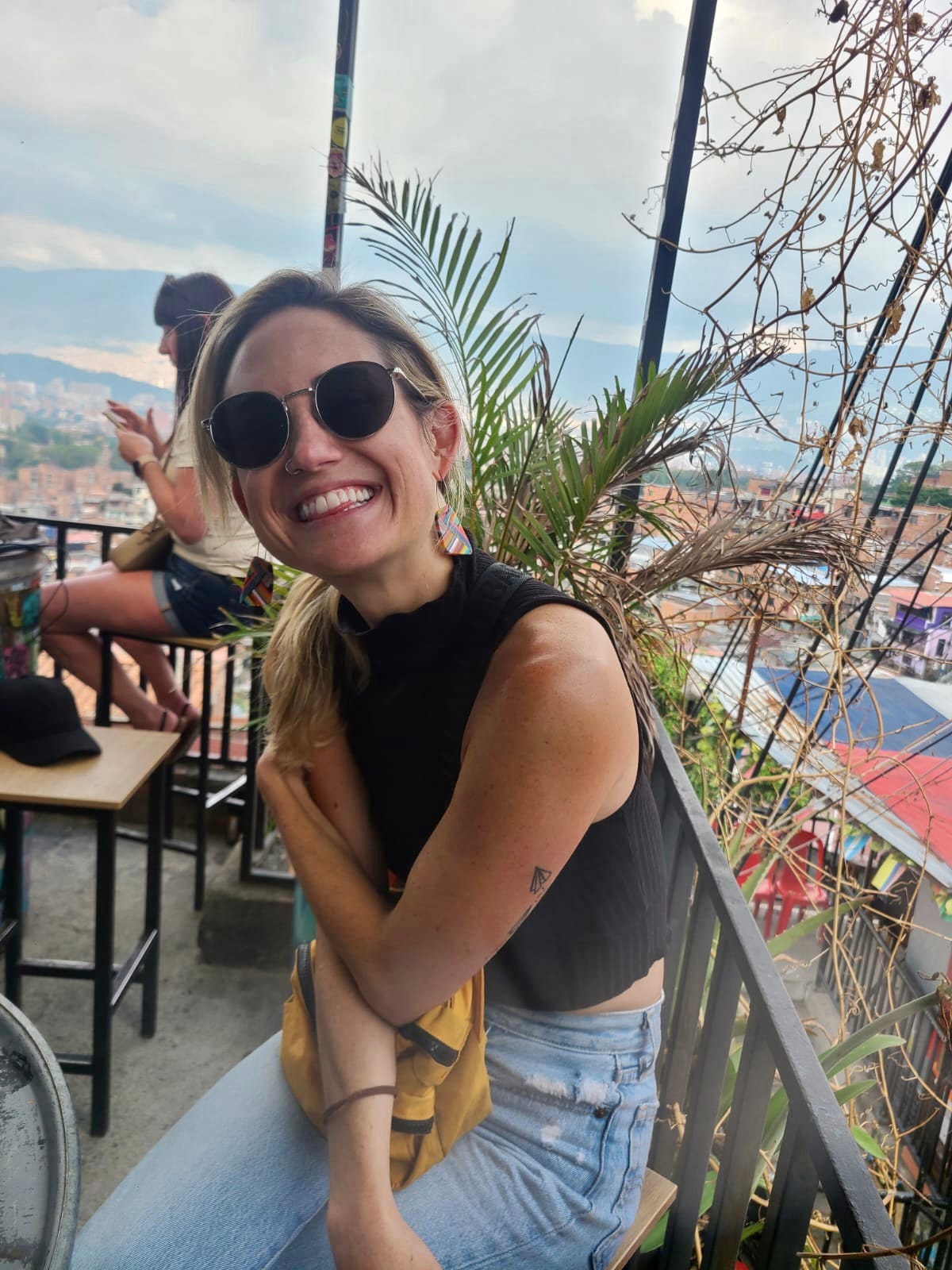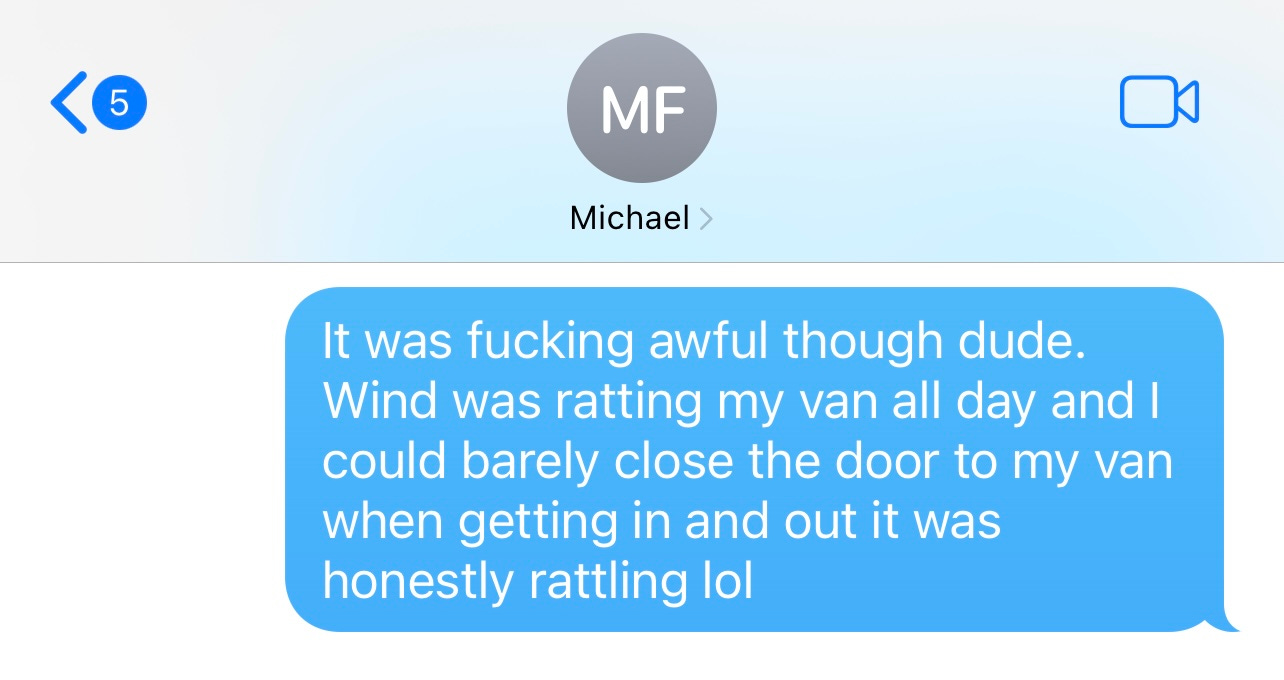Every night, like clockwork, I return from the gym and as I shrug off my puffy coat, shaking the Chicago winter snow from my hair, I feel the expected vibration of a text from my mother.
“Spanish tonight?” She asks.
“Sure thing,” I respond. “How about 9?”
It’s a familiar exchange, a habit we’ve only recently established. And when the time comes, I settle onto the couch and call her, exchanging pleasantries as we open our eBooks of Advanced Beginner Spanish short stories to pick up where we earmarked the night before.
“Lista?” She asks.
“Vamos.”
From there, she begins to read aloud. Slow and steady, pronouncing each word thoughtfully, I close my eyes and lean against the couch pillow — my Intermediate Spanish most useful for when she is unclear whether the narrator is speaking to this person or that.
Some nights, it’s tedious - translating sentences. I notice my waning attention span when I scan ahead of the story. But more often, I try to live in how special it is to share this practice with my mom, and I quietly swell with pride for her newfound dedication.
Like me, my mother does not go gently into any night. Once she pursues something, there is no question as to what that project may be: her retired days now filled with online Spanish classes and nights with a 500+ day Duolingo streak.
She’s relentless, intimidatingly productive, born with iron-clad determination. When people comment on my own tendencies for intense preoccupations — I point to her to suggest I had no genetic alternative.
This mutual interest in Spanish, however, still comes as a surprise: a domino effect of choices which began when my Colombian ex and I started dating and my parents booked a trip to Medellin to visit the city I drone about in social posts.
Desiring to articulate basic requests, my mom studied Spanish briefly in preparation for their trip, catching me off guard when one day I picked up the phone and she responded with “Qué tal?” y “Cómo estás?”
Once they arrived, and my ex graciously made himself available to translate, I noticed as her interest piqued when she’d ask him repeatedly how to articulate this word or that.
Following Medellin, she proudly informed our family that she’d signed up for local Spanish classes. And I remember mouthing “wow” to my ex over the phone speaker.
“Cute,” he’d said afterward. “It’s sweet that she’s trying to learn.”
“Yeah, it’d be nice if she could talk to your grandparents one day,” I lamented, my dream of us having children of different backgrounds and mixed cultures stronger - and more viable - than ever.
But after we split and I no longer lived in Medellin, I was unsure, and frankly sad, about whether she’d continue advancing given the need was no longer as pressing or present. But, it’s safe to say that her interest has only heightened.
And she’s improved drastically in the year and some she’s dedicated to the language. So much so that it highlights how stalled my own language progress became during the period my ex and I dated. Despite us living in Medellin, despite his family being Colombian natives, and despite later living only three floors above his parents in Canada — we spoke English so often that my ability hardly improved during our time together: stuck between fragmented sentences to his father and occasional fluidness of adult conversation.
The hindsight frustration I feel about that lack of progress, coupled with my mother’s now laser focus, has also re-surged my own desire and bonded us at present, lamenting daily over our frustration with “haber” and subjunctive tense.
It’s sweet, or dulce, I could say: our texts often now written in broken Spanish — and we even share the same Spanish teacher.
In March, my mom will return to Medellin, where I will have once again trekked back for winter and spring, to immerse herself further in the language.
I’m excited for the experience with her. Grateful to have this interest we continue to build together.
And if, by chance, my ex were to stumble upon this —
Then yes, you needn’t wonder: of course I think of you.
A strange aftermath in losing you —
I’ve never wanted to learn your language more.
In the time since my ex and I upheaved our life together, what’s lingered has surprised me.
At first, his constant use of the word “rattle.”
“You’re rattling me,” he’d quip about anything remotely unsettling. “That’s rattling. I’m rattled.”
Rattled this, rattled that. In the beginning, I thought it was a language barrier and I’d offer alternative words. But over time I came to understand that for a man who speaks multiple languages — he juggles them by finding comfort in a handful of fail-safe adjectives to cover a range of emotions.
Eventually, I found bemusement in the ways he’d fit the word into daily life, smiling quietly when he’d tell a story and end it with a variation of “Isn’t that rattling?”
After we split and I no longer heard it, I adopted the habit instead.
“I’m rattled by my workload today,” I’d find myself saying in the months after. “My client is rattling me.” So much so until finally my brother looked exasperatedly one day and confirmed “Enough. You still talk like him.”
With that, I haven’t used the word since — though I find it often still sits on the tip of my tongue.
More inexplicably, my ex’s penchant for Reggaeton — specifically Bad Bunny — has also grown into a jagged cornerstone of my daily life. Coupled with the ongoing Spanish lessons, calls with my mother, and my upcoming winter back in Medellin, and I’d venture to guess 75% of my day is about to be now cloaked in Spanish.
If I could, I’d proclaim to him: “And would you even believe I’ve memorized nearly all of Bad Bunny’s Debí Tirar Mas Fotos?”
That at 8:00AM — stirring my morning coffee — I shuffle my Spotify playlist until the Puerto Rican melodies fill my AirPods; mumbling the lyrics mindlessly until a Zoom call breaks my train of thought.
The hypocrisy not lost how I used to scoff when he’d force this exact music into our morning routine.
“Must we listen to Bad fucking Bunny at 7 o’clock in the morning,” I’d moan from bed, throwing a pillow over my face, as the recognizable drum beats and snare wafted from the bathroom speaker after he turned on the shower.
But it’s a wasted output really, memorizing all these Reggaeton lyrics now, like learning how to do a cartwheel at 35: no one at present who appreciates the lengths I’ve gone to to learn them — my current boyfriend raising his eyebrows when I trail into his office singing loudly of “lo siento BB; no trates de enamorarme o no te hago coro, eh, eh, eh.”
“Do you even understand what you’re saying?” He asks with exasperation, refusing to look up from his day’s acclimation of computer code.
“Mostly,” I confidently assert, knowing anything I don’t understand he most definitely does not either: thankful that I don’t have to translate to his Bob Dylan-worshipping soul how the Spanish lyrics often translate to crude sexual slang at best, machista babble at worst.
Funny enough, I’d be horrified if my now white-bred, Chicago boyfriend started singing these songs. Yet, I secretly thought when my ex sang them it somehow looked effortlessly sexy, even when repeating how many asses Bad Bunny slapped atop a four poster bed: stifling a smile from the passenger seat of our very unhip Subaru (for the safety of our future kids we decided when we purchased) as he’d flip his NY hat backwards and pretend to be some Medellin Reggaeton chulo.
“Cambiaste la estacion,” I’d repeat instead when Bad Bunny’s “Como Antes” blasted through our car speaker for the millionth time, pointing in agreement to our radio when the verse sang: “Nada de reggaeton; Ponme otra canción.”
And predictably he’d just smile, turning the volume up dramatically while I feigned an exasperated eye roll—our own familiar rhythmic communication, the quiet choreography that couples dance to over time.
Lately, when I feel fatigued, dragging myself to the Spanish calls with my mother with little fanfare, I try to remember how my ex and I would sit at night on the balcony of our apartment in Medellin with his childhood friend and girlfriend, and I’d listen intently as they passed a spliff between them, shooting the breeze in their native tongues.
How I’d sit on the green plastic chair nearby, my legs tucked under me, and wave the smoke from my face as I tried helplessly to follow their flowing banter.
Sometimes, typically when I’d had a couple glasses of wine, I felt I tracked their conversations with grace: music, politics, parents, work. I’d nod in sync, throwing in my two cents in broken Spanish fragments and sentences.
Other times, I remained hopelessly lost, having little to cue from and instead shamefully forced to watch as he grinned lazily at something said, waiting for when he’d look at me: “Did you get that?”
I’d shake my head. “Parts of it.”
Usually, I was lying. Once I lost focus, he might as well have spoken Mandarin.
But he never asked which parts I understood, and I like to think it was to spare me embarrassment of being put on the spot. Instead, he’d backtrack the conversation to English: hands waving in front of his face as he tried to recall how the conversation went and how to translate three peoples thoughts correctly from one language to the other.
Sometimes his friend would jump in, smiling bashfully: “My English is not so good sometimes but I try too.”
“It is,” I’d assure him. “I wish my Spanish was better.”
“You will learn,” his girlfriend encouraged.
To which, my ex would grin at us all before taking a hit of the spliff: “You guys have me, why does it matter?”
And I’d roll my eyes, thinking he really didn’t understand or appreciate what a gift he has.
It frustrated me about him as much as it awestruck — his nonchalance of language. What a remarkable thing it is to communicate effortlessly in a handful of languages. To sit in a group of people from multiple backgrounds — and simply understand.
Once, I remember us walking down the Medellin street. It was a Sunday or at least in my memory it felt like one: our pace leisurely in the mid-afternoon sun, and his dog pulling on the leash as we talked lazily of the forgettable topics that make up a life together.
A couple passed us on the sidewalk, slipping by in what appeared to be deep conversation.
His face lit up.
“Parles français?” He turned and called out. “Québécois?”
They startled momentarily - his foreboding, tattooed and towering presence often rattling (see what I did there?) strangers until he’d smile — but I remember how once he continued in French they nodded gingerly, responding in kind as he explained how he was from Bogota but grew up in Montreal (or that’s what I imagine anyway, as I can not translate hardly anything in French outside of the names of cities).
“Funny,” he’d said after we meandered on. “I never hear Québécois in Medellin.”
“Was it nice to switch to French for a bit?”
He shrugged. “I mean, it’s my primary language,” he paused. “But I don’t really prefer one over the other. At least I don’t think I do. I don’t really think in any one language.”
“You don’t think in a specific language?” I implored.
“I don’t know,” he admitted, furrowing his brow. “I guess it depends on who I’m talking to: when I talk to you I think in English. My parents, Spanish. By myself, maybe French?” He thought more about it before he decided: “I don’t know actually; I’ve never really noticed.”
Growing bored by the conversation, and reaching for his phone in his pocket, I kept on in the way that I do.
“And when you dream?”
He shook his head. “I don’t know. I’ll have to record it I guess. I don’t think I really dream.”
“Well that’s because you smoke too much weed,” I scoffed.
He rolled his eyes. “Yes I know,” and pinched me lightly on my arm. “You’re so annoying.” And I snorted, waving his fingers from my skin.
In retrospect, what I could have said instead:
I think it’s bloody brilliant — the languages you carry with you in this life.
As I pack to return to Medellin for the first time since we split last summer —
Reggaeton wafts through my new boyfriend’s apartment from the speaker in the bedroom as I fold our clothes.
I’m singing something about Karol G’s life getting better after she left her ex when my partner appears at the door: “Are we taking the pickleball racquets?”
“Already registered us for Sunday in Belen,” I confirm, the snare drum in the background forcing me to raise my voice.
He makes a face toward the speaker. “For the love of God. We’re about to be assaulted with Reggaeton for months. Can we please listen to something else before we leave?”
I smirk, looking up from my half packed suitcase and making a hand gesture as he removes my Bluetooth playlist and connects to his folk poets.
It’s not lost on me this irony.
And ultimately, I don’t think we’re meant to understand why so much remains threaded of people who come and go in this life. Why my ex’s preferred music and native language have continued weaving themselves through me (and my family) at present, in spite of the horrendous mess we made of things.
I suppose that’s the thing about relationships: when you choose them, you unknowingly choose their impact too, whatever that impact may be. You choose a human to share time with, unaware that if you leave — you will still spend ample time with their ghost.
A choice to either embrace what they’ve influenced — and live harmoniously beside its impact, or fight against it and attempt to diminish its hold.
Even when it stings — and man does it sting — I suppose I don’t resent living in tandem with the lingering influences of the people I’ve loved who are no longer with me.
I don’t mind honoring the chapters in my life — to read Spanish short stories now with my mom, or translate Spanish slang in reggaeton — and all the while hold a muted gratitude to you, my ex, for reminding me just how beneficial it is to learn other ways to express the complex, confusing, expansive feelings we have throughout this existence.
At times, it feels I still talk to you. As though some of these songs or stories were written by you yourself, and I’m here now — trying to make sense of them.
To understand you in the aftermath, your culture, your pain.
To let you go in this life —
But also send love to you, in your native tongue:
Nada es como antes —
Pero que buenos tiempos aquellos ey,
Y recuerdos muy bellos.
Te quiero agradecer por todo, para siempre.
I thank you for everything, for all-ways.
Now, it’s time to go call my mom <3











Loved this one so much. Your way of wrapping it at the end made me cry.
🤍🎶 ay, que cuchi! Loved this! 👏🏼